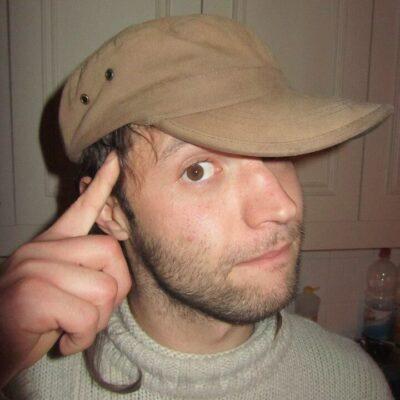The sun had set over Diyarbakir: Turkey’s most populous Kurdish city. The heat had subsided. And after the Turkish fighter jets’ intimidating flights over the rooftops came to a pause, the quiet was reinstated. It was time to go.
We were soon sitting on the curb of a dark street, backpacks lying on the side, waiting for the bus. As minutes elapsed and no such appeared, I suspected we were in the wrong place. The driver of the bus that did finally come confirmed my suspicion. But since my Turkish wasn’t much better than his nonexistent English, the only hint I received as to the correct location was his backward-pointing finger.
We had plenty of time, so I didn’t panic yet. I began panicking only after the same course was repeated at the second bus stop we tried. At last, however, we got it right on the third try… Or so I hoped.
Anxiously, I attended the transit bus’s wayward course on the GPS. It seemed to take turns at random, meandering around the city’s chaotic complex of still-busy thoroughfares. The public transport company could save a lot on fuel by planning shorter routes; especially since our being the only passengers suggested these weren’t in great demand.
I was clueless as to when or if the driver would decide to steer towards our destination. Despite him nodding, I still doubted whether he’d understood where that was. I relaxed when he ultimately pulled over and pointed us to the central bus terminal in the distance, whither we had to walk across eight unlit motorway lanes, over a tall traffic barrier that bordered them, and through some hundred meters of sandy wasteland.
Thanks to my general prudence in keeping good buffer time, we still had an hour to kill before departure and avoided starvation. Our meal at the station’s sole restaurant was simple but tasty. We complemented it with a hurried chai from the peddler who sauntered along the platform. And then we boarded the bus, ready for a long overnight journey.
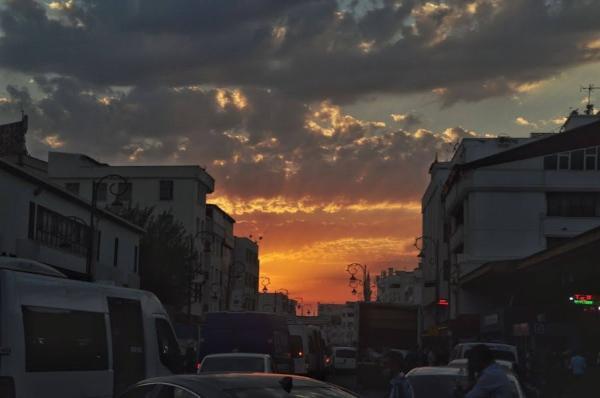
This story is an excerpt from my book "Backpacking Iraq", wherein I recount my journey through this misunderstood and fascinating country. The entire book is available to read online for free. But if you'd like to get it on your e-reader or as physical copy (and, doing so, support my creative activity), you may check it out on Amazon.
As usual in Turkey, the bus was plush. The seats were soft and spacious and reclined like the dentist’s. Drinks and snacks were offered lavishly. The chubby driver was a pleasure to interact with; one of those intrinsically jolly men with whom you can share a good laugh without comprehending a single one of each other’s words.
After the city lights faded out in the rear distance, there was only darkness to be seen as we traveled southeast through the arid plains of southeastern Turkey. Past the city of Mardin, we turned east and followed a tediously straight road parallel to the Syrian border.
Opposite was a still-uninvaded by Turkey Kurdish-controlled part of northern Syria. I imagine we would see signs of militarization if anything but the horizon was discernible. Before midnight, we reached the Ibrahim Khalil Turkish-Iraqi border. We now had but 220 km left to our final destination. I wondered how come we weren’t scheduled to arrive before sunup, until I realized the border closes at night. We parked, and the lights went off.
It was still dark when I was woken by the revving engine. A peek at the clock revealed that this wouldn’t remain so for long. We swiftly got stamped out of Turkey and entered the Kurdish immigration office. The queue was long and the clerks slow, but our turn came eventually.
Communication shouldn’t be an issue if, as expected, all we had to do was hand our passports and grab them back. But this didn’t prove to be the case… Several of our fellow border-crossers engaged in the ensuing obfuscation, attempting in creative ways to explain us what the officer wanted. It turned out he wanted money.
Up to the very previous day, we had checked numerous websites, including the official government one, to read that no fee applies to be permitted into the autonomous region of Iraqi Kurdistan. We tried to argue, but there was no use—not least because no-one understood our arguments.
We had to compromise and pay $80 each, which increased to $100 after adding the exchange rate. For days to follow, I believed they’d ripped us off big time. Only after meeting other travelers, I verified that the rules had indeed changed recently; they just hadn’t yet bothered with updating their site.
The rise of a warm-orange sun found us drinking a cup of tea at a service station a few miles into Iraq. Cragged mountains and barren fields then appeared under a lovely blue sky. Our first day in this fascinating country had just begun. Still early morning, we got off at Erbil’s international bus terminal.
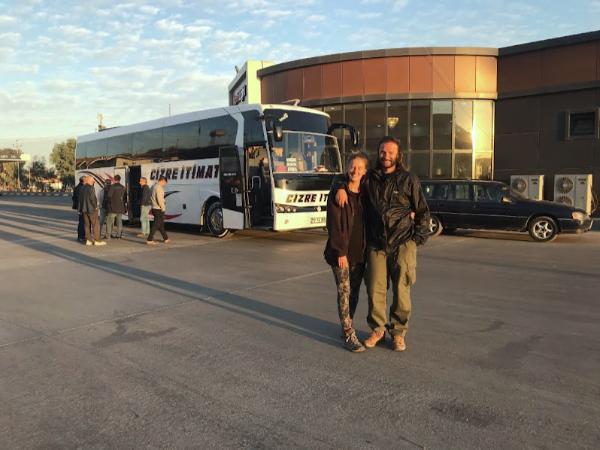
We’d later find out that in Erbil it’s better to move around in taxis; not only because they’re cheap but chiefly because public transport is all but absent. But adhering to habit for now, we zoomed by the touting cab drivers and exited the station in search of a bus to the city center.
Across the noisy main street, a young English-speaking man approached us. He was a Syrian-Kurdish refugee trying to make a living in his new home as an interpreter. I assumed he stationed himself there on purpose, waiting for potential incoming foreign clients. We made clear he wouldn’t find them in us, but he nonetheless volunteered to help us to the bus… or the closest equivalent, anyway.
It was a crumbling minivan. No seats were free, but we somehow squeezed into the rest of the hunched, standing passengers together with our bags. The heat outside felt comforting compared to the suffocation inside when we hopped off downtown.
Now we were on a bustling street. People and cars competed over the scarce space between the lined-up stalls on either side. So did shouts and horns over the frequencies in the air. It took some shoving and near run-overs until we broke free to occupy a piece of uncontested ground to stand in peace and make a plan.
Before anything else, we needed cash and a sim card. It’d be useful to have the latter for finding a place to get the former, but for obvious reasons, this wasn’t a workable sequence. Instead of looking around at random, we located a nearby exchange office on my offline map and made for it.
I had heard that Erbil is a very safe city, but only upon reaching the spot I realized to what an extent. The exchange office, which turned out to be one of many in an array, basically was a stall on the pavement stacked with thick note bundles of various currencies. Not a single security guard was in sight.
The rate was favorable, particularly in comparison with the border. We pocketed our fresh Iraqi dinars and soon employed them at a mobile phone shop. Having secured the essentials, we were ready to… wait.
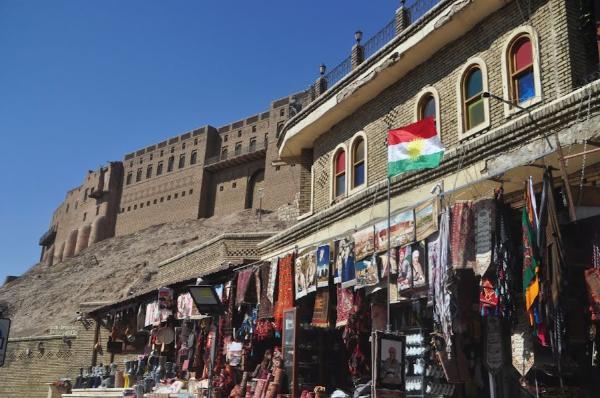
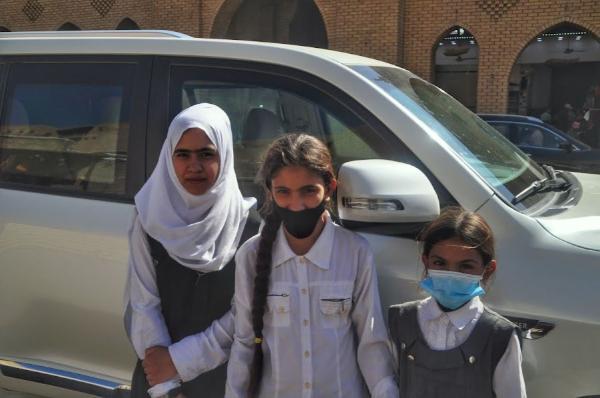
While still contemplating this journey, research revealed that we’d never make it come true were we to pay every night for accommodation. We needed an alternative. Of course, we had our tent. But we could also do with a little extra comfort if offered. For this first stage of the trip, we’d get sorted by a Couchsurfer; only that we had a good few hours to kill until he finished work in the afternoon.
We wound up at the city’s central square, which was duly dubbed the City Park. Surrounded by a citadel, a mosque, and a bazaar… strolled by veiled women and thawbed men… frequented by vendors hawking a thousand wares and one… it felt pretty oriental over there.
At one corner, there was a comely traditional cafe on a balcony overlooking the square. That’s where we settled for as long as it took to feel embarrassed for occupying one of their few coveted tables over two long-empty cups of coffee.
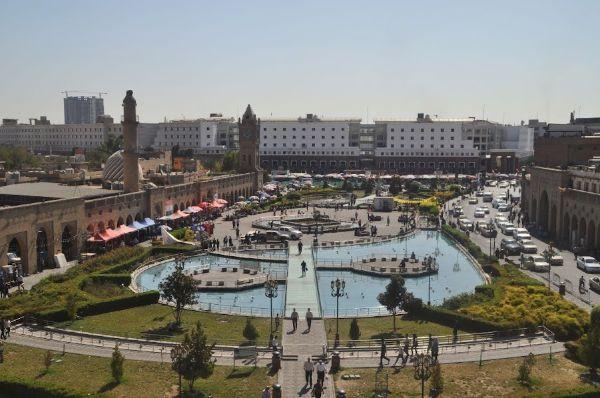
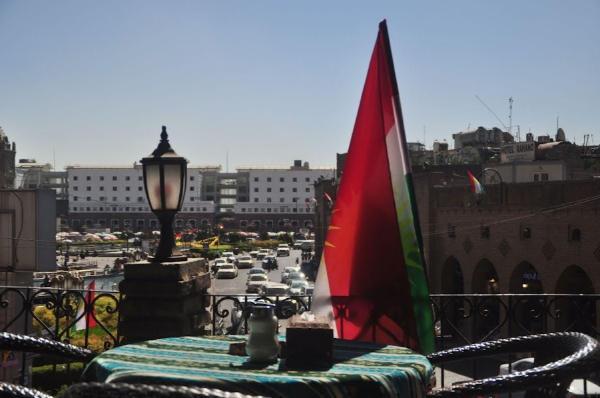
It was past midday by then. We could start walking towards our host’s place if we knew in advance where about that was. But since we didn’t, we picked a direction by hunch and hoped it’d bring us closer. Sure enough, when he finally called, we found out it was the exact opposite one. We about-faced and began eating into the 6 km to his flat.
Outside of the historic old town, the city was typical of a petroleum-driven Middle-Eastern urban center: mostly unutilized broad streets and large structures scattered throughout the bleak land; the sort of place where you see people only behind car windows. We followed one of those streets until we took a turn into a more populated district known as Naz City.
The main road was relatively lively. A few pedestrians used the narrow pavements, and small shops operated on the ground floors of the low apartment buildings. In one of them, above one of the barbers who occupied every third shop, lived our host.
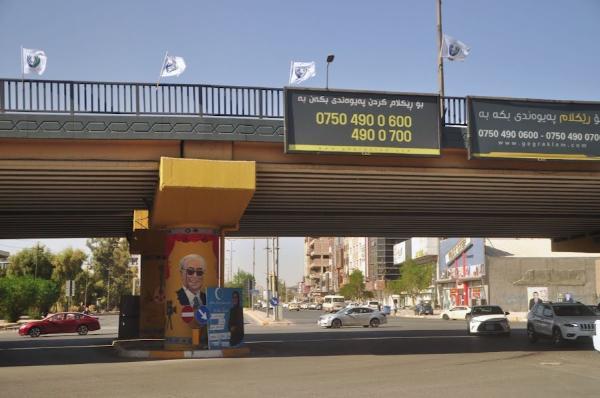
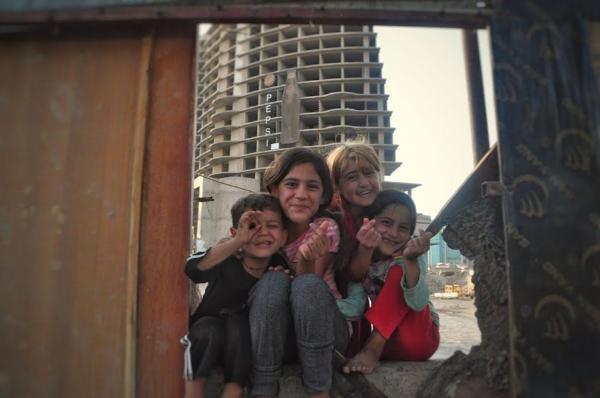
Ahmed was a young, gentle, and intelligent Syrian man from the country’s prosperous, government-controlled coastal regions. He had recently moved to Erbil to evade mandatory conscription back home. He worked there as a freelancing Arabic teacher for English speakers while endeavoring to fix the capital and paperwork required to fulfill his dream of moving to the US. Besides a generous host, he proved an excellent company during our stay.
His place, frankly speaking, was quite a shithole: a tiny bedroom adjacent to an equally tiny living room with an open-concept kitchen and a ceiling window to a narrow lightwell as its sole source of natural light. For our needs, however, it was little short of a palace. The two couches were long enough to lie straight with feet only dangling off the edge. The dimness allowed for unobstructed snoozing. And there was sufficient space to cram all our stuff in a corner.
After a brief rest, we left our new friend alone to give a scheduled online lesson, agreed to meet later for dinner, and took a taxi back to the center.
The area around the City Park was busy at night. Folks almost jostled through the square and the contiguous streets. Drivers endured the congestion apparently for no reason other than to show off their new, big pickups. Waiter boys rushed all over the place, carrying hookahs and trays with teacups.
We settled on two of the few available, typical-of-Middle-Eastern-teashops dwarf stools on the roadside and engaged in keen people-watching. Our activity’s subjects were at least as interested in us as we were in them. Some greeted us with nods; some with whoops and horns. Others only stared at us snoopily, walking past us with necks swiveled backward and almost crashing on others coming against them.
Time killed, we returned home, cooked dinner, and had some drinks with Ahmed. We went to bed late at night.
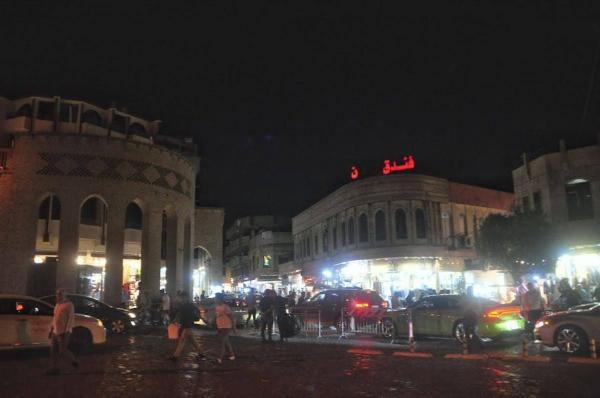
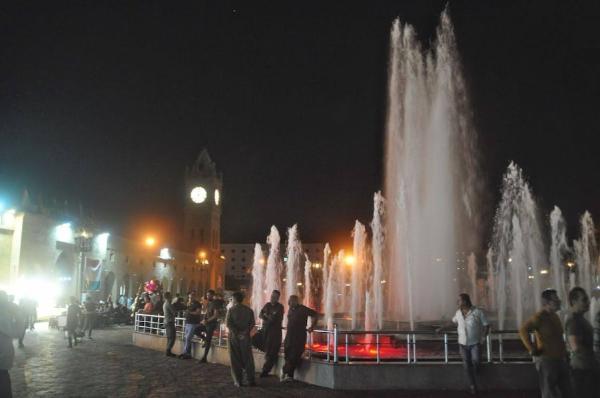
We devoted the next day’s first part to a bit of sightseeing…
Once again, we made for the historic center and took the pathway up to the city’s imposing citadel. Built atop one of those artificial mounds that are known throughout the region as tells, this ancient stronghold is believed to have been inhabited for at least 6,000 years. It ceased being so in 2007, when the municipality evicted all residents to proceed with the site’s intended renovation.
Unfortunately, fifteen years later, it seemed they’d made minimal progress. Out of a maze of paths, only the central street was accessible to the public. Although a few structures were patently refurbished, most of the complex was in shambles. Makeshift scaffolds stood here and there, but not a single worker was on site.
Anyhow, it was a moving experience to walk over those antediluvian grounds and imagine human life during the nascence of civilization. And being on top of the sole elevated position in all of Erbil, we got to marvel at some splendid views of this vast, sparsely built city amid the surrounding desolation.
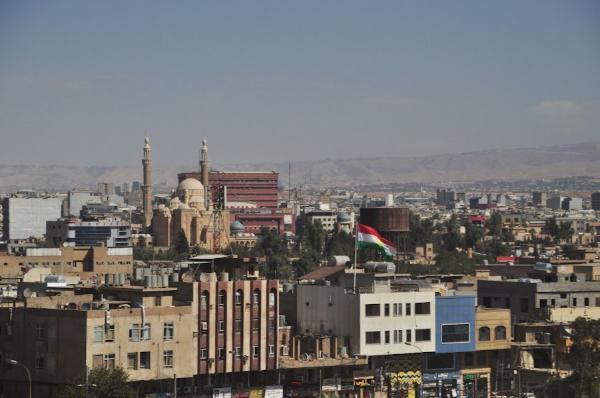
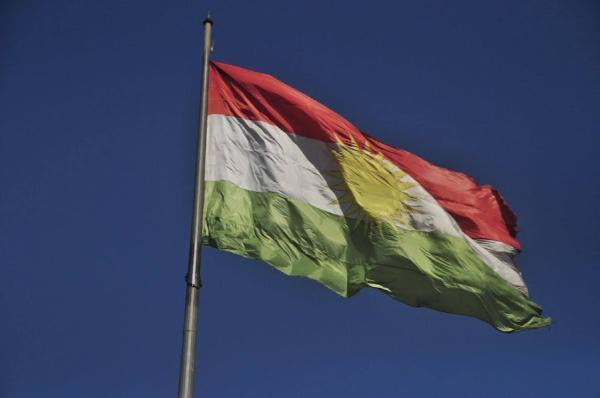
Then we went for a saunter around the city’s historical market, situated right below the citadel’s southern side. Qayseri Bazaar was established in the 13th century and consists of a mesh of narrow, claustrophobics-unfriendly roofed alleys. Clustered together by kind, shops in there offer a mindboggling variety of merchandise ranging from cheeses to gold jewelry.
The only products I showed interest in were of the imaginative diversity of confection that kept me satiated until dinner time. Sophie also bought a pair of baggy pants that would later prove of value in not scandalizing the conservative portion of Iraq’s Arabic population with her tight leggings.
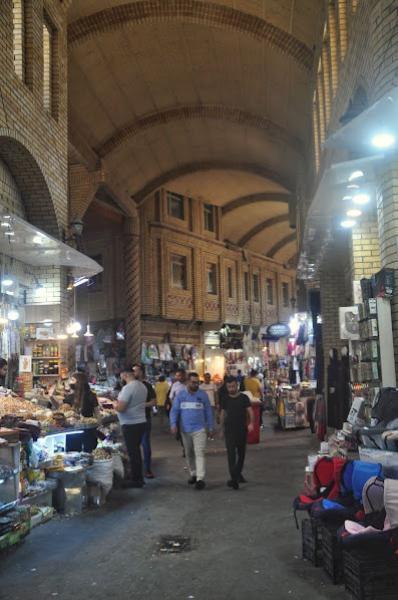
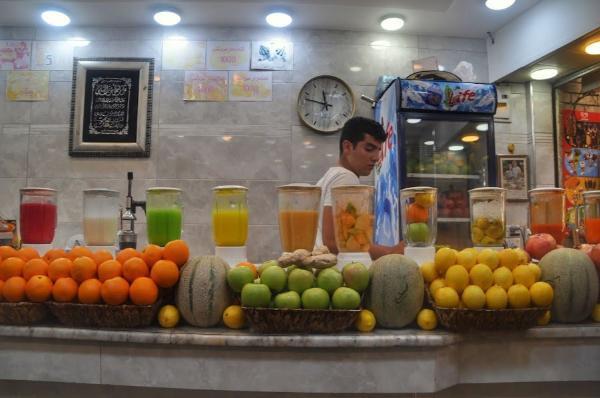
That was enough sightseeing and shopping for one day. We lounged at a traditional teahouse with a local Couchsurfer and a Dutch couple we met. The consecutive teacups contained more sugar than water and, in combination with the sweets from before, abetted my dental health deterioration.
At around noon, it was time to proceed with the day’s pressing mission: withdraw money…
We were warned beforehand that it’s tough to find ATMs accepting foreign cards in Iraq. I have in the past lived through those long, frustrating days wasted on touring a big city’s cash machines.
We had ensured to procure an ample amount of cash in advance from Turkey. But since I have an unflagging tendency to overestimate my scrimping ability, and especially for the unforeseen border fee, it already on day one became obvious that this amount was, in fact, far short of ample.
Helpfully, Ahmed directed us to a particular ATM that had worked for some of his previous guests. That’s whither we now headed, hoping.
The way was long and grew longer in view of a lengthy detour bypassing the blocked streets around the Kurdish parliament building. We aspired to offset this additional distance via a shortcut across the immense Sami Abdulrahman Park, which used to be a military base during Saddam Hussein’s reign, but this, too, turned out to be restricted. Only a small segment was open to the public. We strolled through it, thus becoming the sole two members of the public making use of its openness.
At last, we reached the bloody ATM. Our agony ended upon hearing the machine’s euphonious telling sound. Although it charged a hefty fee, we were glad to get hold of a fresh bundle of Uncle Sam’s prized paper. We put it to use straight off, buying overpriced coffee and muffins at a Costa’s beside the bank.
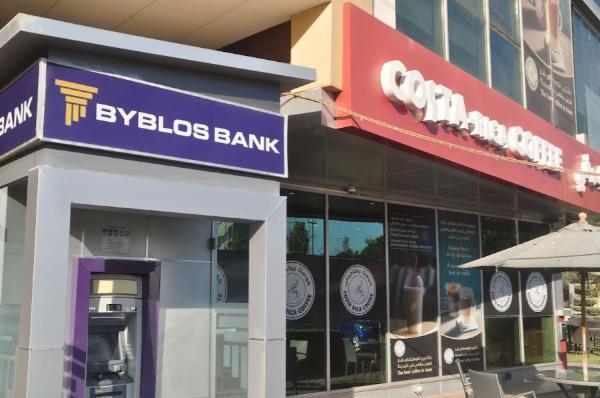
Late afternoon, we took a cab to Ankawa. This is an important Assyrian center that hosts the Assyrian Church’s Patriarchal See. It has a long history as a distinct town dating back to the early Christian era. But nowadays, it’s been absorbed into Erbil to make a suburb. Its population grew fourfold with the influx of Assyrian refugees fleeing genocide by the Islamic State.
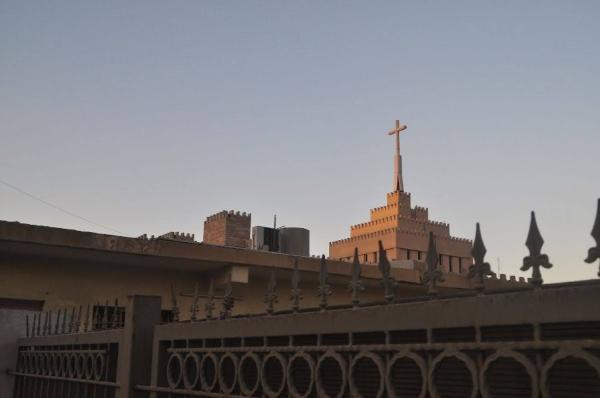
Besides being a holy place for Christians, it also is an entertainment hub for Muslims. Owing to its laxer religious ethics, the area brims with places to booze carefree and sleazy hotels whose standard clientele does not consist of weary travelers.
We had an interesting evening stroll around this peculiar neighborhood’s streets. Aside from casual Assyrian residents, these bustled with scarfless girls in uncommonly short skirts and surreptitiously straggling Kurdish men.
At some point, we entered a church to check out an ongoing mass. The guard at the entrance requested to see our passports before letting us in, presumably because they don’t allow people from non-Christian countries. Upon seeing my Greek document, he spoke in Greek and invited us in cordially. I assumed he was an evacuee of some formerly IS-controlled territory who first fled to Greece before ending up in Ankawa.
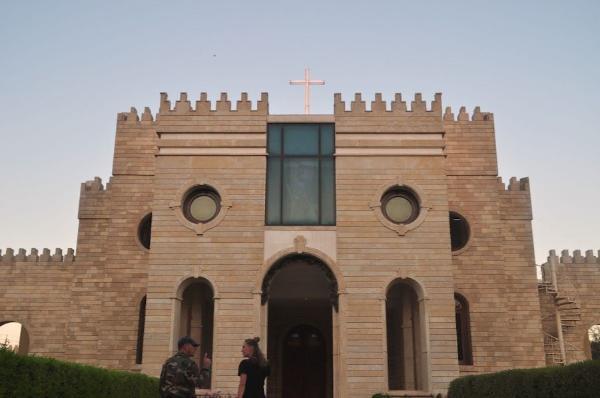
We then met up with a local Kurdish Couchsurfer for a cup of tea. Like most natives of many petrostates, he had a government job that was a job only in the sense that he was getting paid for it, but not in the one that he additionally had to work. He had plenty of free time to build a business of his own while being a regular in Ankawa. He also claimed he had joined the PKK for a spell, but he grew disillusioned with their culture (as well as the uncertainty of long-term survival).
After our chat, he gave us a ride to some place along his way, whence we continued on foot towards a restaurant where we’d meet Ahmed for dinner. We followed the city’s second-outermost ring road, which was bordered by extensive wasteland. That was kept undeveloped to function as a security buffer zone before the airport that lay on the opposite side. I figured that out when I stepped into the bush for a pee and was met by armed guards before I even had time to drain my bladder.
It took some two hours to reach the restaurant. A true Americanophile, Ahmed was fond of the modern and the posh. The place was extravagant in style, and its dressed-like-grooms waiters served us some exquisite Levantine delicacies.
To top those off, we went to a nearby district called Dream City. It was opulent and exclusive, encircled by tall walls and guarded by armed personnel. At a sumptuous local cafe, we ate the most delicious, generous, and expensive dessert I must have had in my life.
It was past midnight when we made it back home and crashed.
Early next morning, we bid Ahmed a temporary farewell and made our way to the country’s northeastern extremity, where we spent some days trekking in the Zagros Mountains. We passed by Erbil again briefly, transiting between two of its bus stations on our way to Sulaymaniyah. And then we returned and settled at Ahmed’s for a couple more days while preparing for the Arab part of Iraq.
These preparations involved withdrawing money once more, booking tickets and sorting out accommodation, and most frustratingly of all, taking a blasted Covid test…
We took a taxi to a clinic we found online. But the receptionist sent us to another one without explanation. We walked for an hour through the midday heat to see the last departing staff locking the door behind them. We were late to take the test there, but right on time for a doctor to drive us to where we could. It wasn’t quite what you’d call a clinic—rather a container in a backyard—but we got tested and paid much less than what we expected.
Apart from such things, our second sojourn in Erbil featured a night out in the Lebanese Village. This tiny burb in the city’s far north end resembled Ankawa in the secular respect. We dined in a fancy garden restaurant whose denizens fell into either of two categories: 1) tacky dudes with pricey-looking watches and gelled hairstyles that could be described as architectural feats, and 2) plump girls with inexpensive (as far as judging from the amount of fabric used) clothes and hairdos inspired by Japanese anime. According to the former, the latter were mostly Iranians on quick business trips.
After these days passed, we left most of our stuff at Ahmed’s place to fly to Baghdad rid of costly check-in luggage. About a week later, we came back overland from Mosul, collected our possessions, and made straight for the international terminal to catch a bus back to Turkey.
Photo Gallery
View (and if you want use) all my photographs from Erbil.
